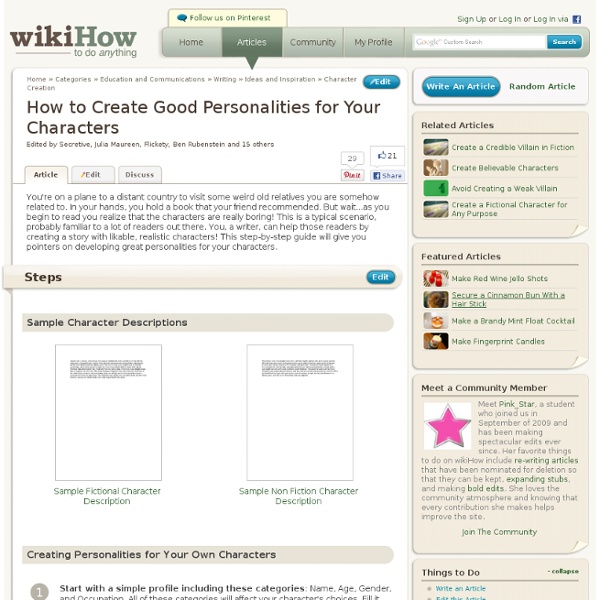How to Plot and Write a Novel: Plan Your Novel Writing with the Snowflake Method
Many novelists mull over story ideas, letting them ripen and develop over time. When the story is ready to be told, instead of just sitting down and starting to type, try the Snowflake Method. This step-by-step way to write a novel begins with essential elements and becomes more detailed with each step. Essential Elements for Novel Structure Snowflakes have a structure which begins with a simple form and adds more elements to create complex patterns. Novelist and physicist Randy Ingermanson created the Snowflake Method to break novel-writing into steps that build on each other in the same way.
Questionnaires for Writing Character Profiles - Creative Writing Help
Enter your e-mail to get the e-book for FREE. We'll also keep you informed about interesting website news. "I have searched the web and used different worksheets, but none have come close to your worksheets and descriptions of (what to do and what not to do). Both courses I have taken have with Creative Writing Now have been amazing.
Fantasy: Getting Started
By Sandra C. Durham © 2003, Sandra C. Durham his is a newcomer’s guide on how to get started in the genre of fantasy writing, from one newcomer to another. The majority of what is discussed here has come from the Forward Motion community as well as from occasional meanderings on the Web based on pointers given by members of that writers' community.
Characterisation
How to write convincing characters Characterisation - the task of building characters - isn't easy. But if you're struggling to build characters with real life and vigour, just follow these rules.
Point of View in Creative Nonfiction
I read a lot of novels, and poetry, and even the occasional screenplay/drama. I enjoy them; I learn from them; I find them delicate, and robust, and powerful, and skillful and all the things that make good writing. BUT when I want to really understand something, when I want to feel it in the center of my chest, when I want my cheeks to be rasped with the reality of life, I turn to creative nonfiction. There’s just something about the authenticity of the writer’s perspective there that makes me connect more fully.
Words of Wisdom: 101 Tips from the World's Most Famous Authors
If you've ever wanted to sit down with your favorite writer and ask advice, then you should take a look at these tips from some of the most famous authors in the world. These valuable bits of information provide guidance on strengthening your writing skills, becoming a better fiction writer or poet, learning to tap into your creativity, advice on education and school, and even a few suggestions on success and living a meaningful life. Of course, another excellent way of improving your writing is through traditional or online master’s degrees in creative writing. General Writing Tips
Great Poems « Greatest Books of All Time » Life-Changing Arts
A selection of great poems from centuries of brillant authors and poets. Whether you are new to the world of poetry and wish to savor it, or a well-versed poetry connoisseur, either way you will probably enjoy the classics of world poetry. The poems are sorted by vote. To vote for a poem, click on the left of it.
How to Create a Fictional Character from Scratch: 12 steps
Edit Article Sample Character DescriptionCreating Your Own Fictional Character Edited by Ben Rubenstein, Brigitta M., Tom Viren, Axiom and 52 others The one thing that virtually every single book, play, movie, novel, and game has in common is that they all have at least one character. Most have two or more, and some—a cast of thousands!
Give Your Writing More “Body”
This month’s book review is an overview of my favorite “dead body” books. Whether you are writing a mystery, suspense, action, or any sort of fiction, these are excellent tools for getting the details right, plus they make for terrific Halloween reading. Another way you can use these books is as a brainstorming tool.
25 Things Every Writer Should Know
An alternate title for this post might be, “Things I Think About Writing,” which is to say, these are random snidbits (snippets + tidbits) of beliefs I hold about what it takes to be a writer. I hesitate to say that any of this is exactly Zen (oh how often we as a culture misuse the term “Zen” — like, “Whoa, that tapestry is so cool, it’s really Zen“), but it certainly favors a sharper, shorter style than the blathering wordsplosions I tend to rely on in my day-to-day writing posts. Anyway.



